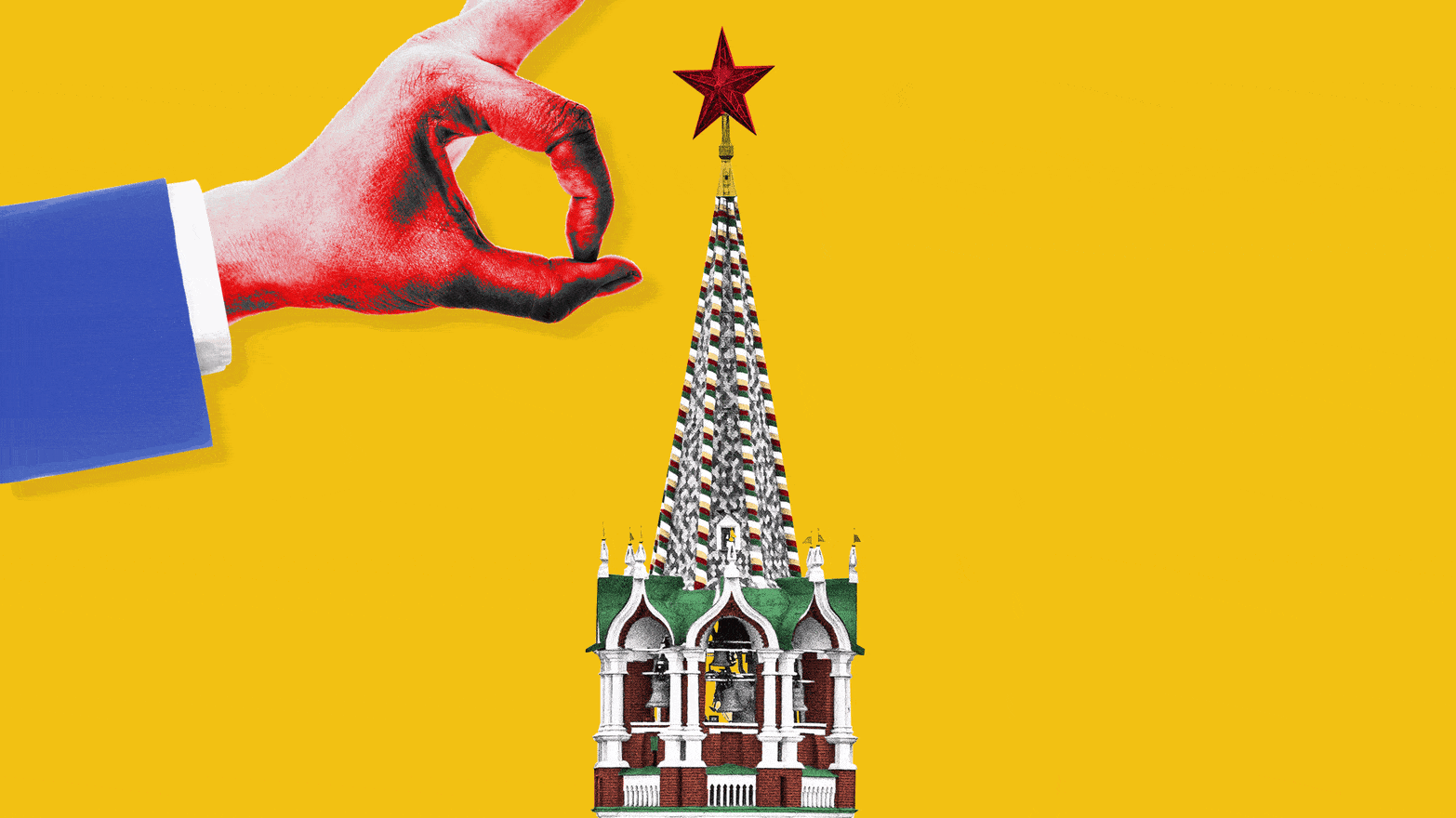At a Capitol Hill hearing in January, as lawmakers were hounding him about the Trump administration’s slow implementation of mandatory sanctions against Russia, Treasury Secretary Steven Mnuchin was backed into a corner.
And he blurted out something he would come to regret—by accident, The Daily Beast has learned.
“There will be sanctions that come out of this report,” Mnuchin said—a surprise statement, because while Congress had ordered the department to create a report on Russian oligarchs, it didn’t require that any sanctions be imposed based on it.
Mnuchin’s slip-up forced Treasury officials to scramble to come up with a plan that would match the secretary’s under-oath statement, according to four congressional sources directly involved in the sanctions process. And in April, the department sanctioned Russian billionaire Oleg Deripaska and his aluminum company Rusal.
According to those sources, Treasury broke protocol and did not coordinate closely with other departments to properly scrutinize Deripaska and evaluate the impact of the sanctions—which roiled global markets and caused aluminum prices to skyrocket, mainly affecting U.S. partners in Europe.
Now, Mnuchin is backpedaling and considering lifting the sanctions, although Treasury officials deny that they didn’t understand what punishing Deripaska would cause.
The about-face is one example of what more than a dozen lawmakers and current and former U.S. officials described as an administration beset by incessant communication breakdowns.
Nearly two years after the 2016 transition—when dozens of staffers involved in sanctions left the government—the inter-agency process to draft, implement and enforce sanctions is “broken” and a “complete mess,” said a congressional source who works directly with the Trump administration on the issue.
The Rusal mishap exacerbated a four-year debate, spanning two administrations, about how far to go in punishing Russia—for its annexation of Crimea, military interventions in Syria and meddling in U.S. elections.
“There’s a civil war inside the administration over Russia policy,” Sen. Chris Murphy (D-CT), a member of the Senate Foreign Relations Committee, said in an interview. “There are some really strong voices in the State Department that want us to push back more on Russia, that want the president to use the sanctions policies. But they’re fighting the president.”
The current sanctions regime has done little, if anything, to change Russian behavior, lawmakers told The Daily Beast. And the Trump administration has not developed a cohesive strategy to protect U.S. national security interests from the growing threat emanating from the Kremlin.
“Why are we letting them push us around? How are they getting away with this?” Sen. Ron Johnson (R-WI), who recently returned from a trip to Moscow with some colleagues, said in an interview. “I think we just really don’t have the kind of confident response or coordinated response.”
Now, with increasing evidence that Russia is actively interfering in U.S. electoral politics, the White House must make a major decision: continue using a light touch to keep Moscow at bay, or side with growing majorities in Congress to deal a major blow to the Russian economy.
Harsher sanctions might catapult U.S.-Russian relations into an uncertain future and change the way dozens of countries conduct international trade, officials said. New financial penalties could also adversely impact U.S. allies in Europe, where relations are already strained due to Trump’s tariff policies and his attacks on the NATO alliance. Many of those nations rely on Russian natural gas imports, which Sen. Dan Sullivan (R-AK) described to The Daily Beast as Putin’s “huge geo-strategic weapon.” They also rely on existing contracts with Rusal, and European leaders have appealed directly to the Trump administration in light of the Deripaska sanctions.
“It’s a really fine line the administration is walking here,” said one former senior Treasury official. “If the administration goes too far with sanctions it risks not being able to walk things back. But if the sanctions aren’t harsh enough Russia will continue to find ways to meddle.”
Last week, the White House attempted to assuage some of those concerns when President Donald Trump signed an executive order to sanction foreigners who interfere in American elections. But officials across the government are skeptical.
The order will do little to alter Russia’s economy and prevent the Kremlin from interfering in the 2018 elections, current and former U.S. officials told The Daily Beast. That’s because it did not designate specific Russian entities or individuals for sanctions. Instead, it laid out a plan to sanction foreigners who are determined to have interfered in future American elections—a process that largely already exists.
“An executive order is very limited in what it can do,” Sen. Marco Rubio (R-FL), who co-authored a sanctions bill of his own, said in an interview. “So I don’t think it does anything to take away the need to have a deterrence mechanism into law.”
With the 2018 elections rapidly approaching, lawmakers want to move quickly on legislation that would sanction Russia harder than ever before.
But their efforts are being stymied by a White House that is desperately trying to maintain the image that the U.S. is on a path to restoring relations with the Kremlin, current and former officials said. While Trump has taken some actions against Putin, such as expelling Russian diplomats and arming the Ukrainians, members of his national security team worry that unreasonably tough sanctions will irreparably damage its relationship with the Kremlin—a view shared by President Barack Obama during his time in office.
Meanwhile, in Russia, many are worried about future U.S. sanctions. Some of the Republican lawmakers who joined Johnson in Moscow told The Daily Beast that the Russians seemed fixated on what’s to come.
Economists in Moscow say the Russian government has implemented measures to insulate the economy from sanctions, which is growing at a steady, if relatively low, pace.
“The Kremlin doesn’t really care about sanctions,” one source with first-hand knowledge of the Russian international economic strategy told The Daily Beast. “Putin makes complaints about the sanctions in the press to make headlines but really they aren’t hurting Russia in a way everyone thought they might.”
In 2014, Obama and his national security team sat down to devise a roadmap for condemning Russia for its annexation of Crimea. The result was a plan to sanction Russia to the point that it questioned its potential for growth but still allowed the U.S. and other countries to continue trading with the country, three people involved in those discussions told The Daily Beast. One former Treasury official called it a “crazy Frankenstein monster version of sanctions.”
“The concern was these state entities were too big and that the collateral consequences to us and obviously to our European allies even more so would be too great if we went with the Iran model and we just tried to shut the place down,” an ex-Treasury official said.
At a Senate Banking Committee hearing last week, Daleep Singh, the former acting assistant secretary of the Treasury Department, said he was “cautious” about sanctioning Russian sovereign debt in 2014 because “it would harm us reputationally if we were seen as intentionally provoking a full-fledged crisis in Russia.” Yet Congress is now considering sanctioning Russian sovereign debt as a way to deal a decisive blow to the Kremlin—and its economy.
What the Obama administration really wanted to do, former officials said, was force Russia to change its behavior militarily and diplomatically. But the sanctions ended up not having “any real magnitude,” a former State Department official conceded.
That can largely be attributed to the lack of exacting language in the sectoral sanctions, one section of the overall regime, making it easy for Russian entities to continue to conduct business as usual so long as they followed certain guidelines, officials told The Daily Beast.
While the Obama administration continued to roll out sanctions against Russia, word began to spread throughout the intelligence community in the fall of 2016 that the newly elected president, Trump, wanted to change course, current and former officials in the Treasury and State departments said. Trump reportedly ordered staffers at State to develop a plan to roll back Russian sanctions.
“Sanctions were still in place, but it was definitely a confusing time and no one was sure what would happen under the new administration,” one former senior Treasury official said.
That confusion carried over into the early days of the Trump presidency, officials said, as the White House took a vastly different stance against Russia, promising the return of normal diplomatic relations and increased partnerships on the world stage.
Today, members of Congress are scrambling to correct what they view as an insufficient sanctions regime and set the U.S. on a path toward gaining leverage over Russia. The soul-searching comes a year after lawmakers crafted and passed a biting sanctions package primarily targeting Russia’s defense and intelligence sectors.
In recent hearings, senators have been evaluating the effectiveness of existing sanctions and considering what more can be done. Lawmakers have also introduced two bipartisan proposals that have not advanced out of committees or onto the Senate floor. One, written by Sens. Bob Menendez (D-NJ) and Lindsey Graham (R-SC), would immediately sanction the Russian energy sector and its sovereign debt. Another, crafted by Rubio and Sen. Chris Van Hollen (D-MD), would trigger energy sanctions only when the director of national intelligence determines that a foreign actor has attempted to interfere in an American election.
Behind the scenes, lawmakers are venting to Senate Majority Leader Mitch McConnell (R-KY), according to interviews with a dozen lawmakers and aides directly involved in the negotiations over a new sanctions package. They claim that McConnell hasn’t prioritized the issue. Other members, particularly the president’s closest allies, have argued against those bills because they would take too much discretion away from Trump.
But over the past year and a half, Congress has balked at presidential discretion on sanctions, underscoring lawmakers’ distrust of the administration’s—and the president’s—posture toward Russia. In announcing the executive order Wednesday, national security adviser John Bolton said the president needs “full waiver authority,” revealing that a key motivation behind the order was to circumvent Congress.
Lawmakers and Capitol Hill aides have long lamented what they view as a complete breakdown in communication with the Trump administration, particularly when it comes to sanctions enforcement. Republicans and Democrats alike have accused top officials of leaving them in the dark on key elements of foreign policy, national security, and the safeguarding of American elections.
“They routinely shiv us when we try to press for even the most basic information about their compliance with the [sanctions laws],” said a congressional aide who works directly in sanctions policy.
Last summer, the House and Senate passed with overwhelming bipartisan majorities a tough Russia sanctions regime that gave the administration little discretion on implementation. Democrats and Republicans have been engaged in a heated, months-long back-and-forth with the administration over what they view as its unwillingness to fully implement the Countering America’s Adversaries Through Sanctions Act (CAATSA). And instead of fully implementing it, the White House has relied on previous executive orders, some of which were issued by Obama.
Murphy said plenty of Trump administration officials are in favor of implementing tough measures against Russia. However, there’s no telling when—or if—the White House will act on their recommendations, he said.
“There will be these breakthrough moments where the White House listens to the… hardliners. But it’s really hard to predict when those moments are going to come and whether they’re going to last,” Murphy told The Daily Beast.
With the midterm elections less than two months away, there remains an overwhelming desire on Capitol Hill to move forward with legislation that complements Trump’s executive order and punishes Russia. But senators spearheading those efforts are warning that the window is closing for Congress to act.
“If we don’t do anything by the end of September, then we probably won’t do anything,” Sen. Bob Corker (R-TN), the chairman of the Senate Foreign Relations Committee, said in an interview. “I do have the concern of us doing something that’s cutting our own nose off to spite our face.”


